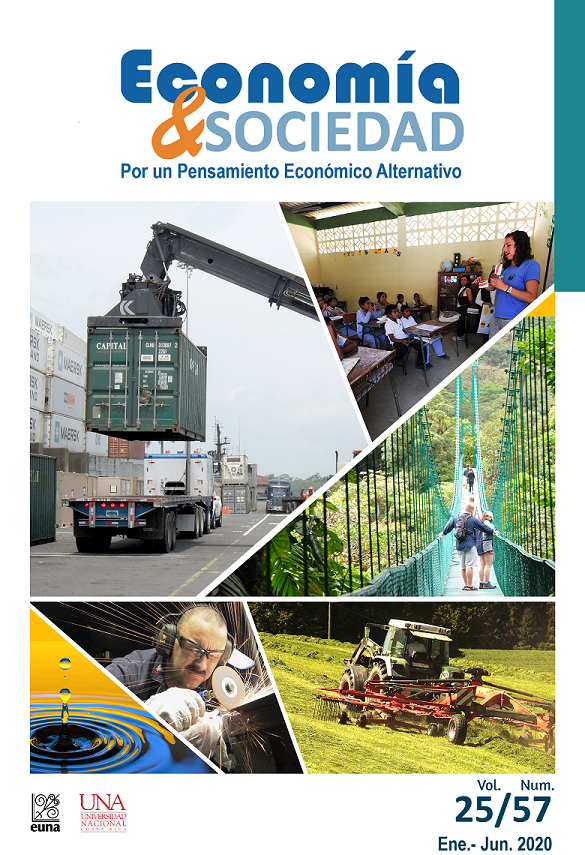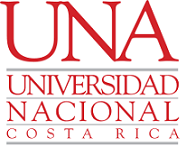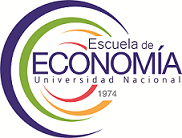The Great Transition: mexican society in the era of oil depletion
DOI:
https://doi.org/10.15359/eys.25-57.8Abstract
The paper explains the challenges that Mexico faces given the new context of oil depletion. We argue that, for the Mexican government, it is imperative to move to a new model that will help the economy face the great energy transition of the coming years.
We conclude that in the new administration there is no realistic assessment of the prospects for the economy in the described context and that the proposed development scheme fails to weigh the role and limitations that characterize oil extraction in the current era. For the current and future governments there is no alternative other than to adjust the economic, financial, social and environmental perspectives of development to a scenario of expensive and scarce oil.
References
Ackerman, F., Nadal, A., & Gallagher, K. (2004). The Flawed Foundations of General Equilibrium. (1st Edition). England: Roudledge. Doi: https://doi.org/10.4324/9780203799963
Acosta, A., & Brand, U. (2017). Salidas del laberinto capitalista: Decrecimiento y postextractivismo. Barcelona: Icaria Editorial. Retrieved from https://dialnet.unirioja.es/servlet/libro?codigo=698886
Asimov, I. (1982). Introducción a la ciencia. México: Plaza Janes. Retrieved from URL
Banco de México (2019). Balanza Comercial de Mercancías de México, datos desestacionalizados (1993-2019). In Sistema de Información Económica. Retrieved from https://www.banxico.org.mx/SieInternet/consultarDirectorioInternetAction.do?sector=1&accion=consultarCuadro&idCuadro=CE134&locale=es
Barkin, D. (1998). Riqueza, pobreza y desarrollo sustentable. México: Editorial Jus y Centro de Ecología y Desarrollo. Retrieved from https://portalacademico.cch.unam.mx/sites/default/files/riqueza.pdf
Barkin, D., Fuente, M., & Tagle, D. (2012). La significación de una Economía Ecológica radical. Redibec, vol. 19, 1-14. Retrieved from https://redibec.org/revista/numeros-anteriores/#ano-2012
Bronowski, J. (2017). El ascenso del hombre. Breve historia de nuestra evolución científica y cultural. (Edición). México: Paidós. Retrieved from http://www.dcne.ugto.mx/Contenido/MaterialDidactico/amezquita/Lecturas/El%20Ascenso%20del%20hombre.pdf
Buscaglia, E. (2015). Lavado de dinero y corrupción política: El arte de la delincuencia organizada internacional. México: Debate.
Caballero, E y Tello, C. (2008). Régimen fiscal de PEMEX. Situación actual y propuesta de reforma. Economía Informa, N. 354. Retrieved from http://www.economia.unam.mx/publicaciones/econinforma/pdfs/354/01emilioytello.pdf
Comisión Nacional de Hidrocarburos. (2019). Reservas de Hidrocarburos en México. Conceptos Fundamentales y Análisis 2018. Retrieved from https://www.gob.mx/cms/uploads/attachment/file/435679/20190207._CNH-_Reservas-2018._vf._V7.pdf
Costanza, R., Cumberland, J., Daly, H., Goodland, R., & Norgaard, R. (1997). An Introduction to Ecological Economics. (First ed.). United States of America: CRC Press LLC. Retrieved from http://library.uniteddiversity.coop/Measuring_Progress_and_Eco_Footprinting/
Daly, H., & Farley, J. (2003). Ecological economics: Principles and applications. (First ed.). United States: Island Press. Retrieved from URL https://indomarine.webs.com/documents/Ecological_Economics_Principles_And_Applications.pdf
Dawkins, R. (1990). El gen egoísta: Las bases biológicas de nuestra conducta. España: Salvat Editores SA. Retrieved from URL
D’Alisa, G., Demaría, F., & Kallis, G. (2015). Decrecimiento: Vocabulario para una nueva era. (First ed.). España: Icaria Editorial. Retrieved from URL https://www.academia.edu/13874240/_Decrecimiento_Vocabulario_para_una_nueva_era_Icaria_Editorial_2015_Espa%C3%B1a_-_Ebook_in_Spanish
De la Mora, L. (2015). El comercio exterior como palanca del crecimiento económico y desarrollo de México. Comercio Exterior Bancomext, (4), 10-19. Retrieved from http://www.revistacomercioexterior.com/sumario.php?id=5
De Sousa, B. (2010). Descolonizar el saber, reinventar el poder. (First ed.). Uruguay: Ediciones Trilce, Universidad de la República. Retrieved from http://www.boaventuradesousasantos.pt/pages/pt/livros.php?searchresult=1&sstring=Descolonizar+el+saber+reinventar+el+poder#wb_section_8
Del Castillo, M. (2019). La desigualdad del ingreso y la riqueza en México. In Gutiérrez, N. (Coord.). Ciclo de conferencias Raúl Prebisch. Conference held at CUCEA Universidad de Guadalajara, Zapopan, México.
Ezquivel, G. (2010). De la inestabilidad macroeconómica al estancamiento estabilizador: el papel del diseño y la conducción de la política económica. In Lustig, N. Crecimiento económico y equidad. Los grandes problemas de México. (First ed., 35-77). México: El Colegio de México, A.C. Retrieved from http://2010.colmex.mx/16tomos/IX.pdf
García, A. (2018, November 26). Deuda Externa de México: ¿A quién le debe México? ¿Cuánto debe? El Economista. Retrieved from https://www.eleconomista.com.mx/economia/Deuda-Externa-de-Mexico-A-quien-le-debe-Mexico-Cuanto-debe-20181126-0053.html
Georgescu-Roegen, N. (1996). La Ley de la Entropía y el Proceso Económico. (First ed.). España: Fundación Argentaria - Visor Distribuciones. Retrieved from https://www.academia.edu/36531761/Georgescu-Roegen_Nicholas_La_ley_de_la_Entrop_a_y_el_proceso_econ%C3%B3mico_Argentaria
Gutiérrez, R. (2014). ¿Está preparado México para el fracking? Reforma energética en México 2014. Sociedad y ambiente, (9), 102-120. Retrieved from: http://revistas.ecosur.mx/sociedadyambiente/index.php/sya/article/view/1635
Hall, C., Lindenberger, D., Kümmel, R., Kroeger, T., & Eichhorn. W. (2001). The need to reintegrate the natural sciences with economics. BioScience, 51(8), 663-673. Doi: https://doi.org/10.1641/0006-3568(2001)051[0663:TNTRTN]2.0.CO;2
Hall, C., & Klitgaard, K. (2012). Energy and the Wealth of Nations. Understanding the Biophysical Economy. (First ed.). New York: Springer Science+Business Media, LLC. Retrieved from https://www.springer.com/gp/book/9781441993984
Krauss, L. (2012). A universe from nothing. Why is there something rather than nothing. United States: Simon & Schuster. (First ed.). New York: Free Press.
Leff, E. (2017). Pensamiento ambiental latinoamericano. Patrimonio de un saber para la sustentabilidad. In Pengue, W. (comp), El pensamiento ambiental del sur. Complejidad, recursos y ecología política latinoamericana. 1a ed. Los Polvorines: Universidad Nacional de General Sarmiento, Argentina. Retrieved from URL https://www.researchgate.net/publication/321148706_EL_PENSAMIENTO_AMBIENTAL_DEL_SUR_Complejidad_recursos_y_ecologia_politica_latinoamericana
López, D. (2019). Ni todo el poder del narco pudo evitar que estos ex gobernadores asociados con el crimen organizado fueran extraditados a Estados Unidos. In Infobae. Retrieved from https://www.infobae.com/america/mexico/2019/10/29/ni-todo-el-poder-del-narco-pudo-evitar-que-estos-ex-gobernadores-asociados-con-el-crimen-organizado-fueran-extraditados-a-estados-unidos/
Martínez, J. (2009). El ecologismo de los pobres. (First ed., 395). España: Icaria.
Martínez, J. (2013). Hacia una economía sostenible: dilemas del ecologismo actual. Letras verdes. Revista del Programa de Estudios Socioambientales, (9), 5-25. Doi: https://doi.org/10.17141/letrasverdes.9.2011.900
Martínez, J. (2015). La economía no es circular sino entrópica. In Sin permiso. Retrieved from http://www.sinpermiso.info/textos/la-economa-no-es-circular-sino-entrpica
Martínez, J., & Roca, J. (2013) Economía ecológica y política ambiental. (Third ed.). México: Fondo de Cultura Económica.
Park, H., Urmeneta, R., & Mulder, N. (2019). El desempeño de las empresas exportadoras según su tamaño. In Comisión Económica para América Latina y el Caribe. Retrieved from: https://www.cepal.org/es/publicaciones/44664-desempeno-empresas-exportadoras-segun-su-tamano-guia-indicadores-resultados
Petróleos Mexicanos (2011). Anuario Estadístico 2011. Retrieved from https://www.pemex.com/ri/Publicaciones/Paginas/AnuarioEstadistico.aspx
Petróleos Mexicanos (2014). Anuario Estadístico 2014. Retrieved from https://www.pemex.com/ri/Publicaciones/Paginas/AnuarioEstadistico.aspx
Petróleos Mexicanos (2020). Estadísticas Petroleras. Retrieved from https://www.pemex.com/ri/Publicaciones/Paginas/IndicadoresPetroleros.aspx
Pengue, W. (2016) Fundamentos de la economía ecológica. Argentina: Kaicron.
Roegen, N. (1994). ¿Qué le puede enseñar a los economistas la termodinámica y la biología? In Aguilera, F. and Alcántara, V. De la economía ambiental a la economía ecológica. (First ed, 188-198). España: Icaria. Retrieved from https://www.researchgate.net/publication/282077030_De_la_economia_ambiental_a_la_economia_ecologica
Schrödinger, E. (2005). ¿Qué es la Vida? (First ed.). España: Textos de Biofísica. Retrieved from http://leodimieri.16mb.com/elementos/QEV.pdf
Secretaría de Economía. (2015). Inversión Extranjera Directa en México y en el Mundo: Carpeta De Información Estadística. Retrieved from https://www.economia.gob.mx/files/comunidad_negocios/ied/analisis_publicaciones/Otros%20estudios/carpeta_informacion_estadistica_0715.pdf
Secretaría de Hacienda y Crédito Público. (2019). Ingresos Presupuestarios del Gobierno Federal, Petroleros y No petroleros. Retrieved from http://www.shcp.gob.mx/POLITICAFINANCIERA/FINANZASPUBLICAS/Estadisticas_Oportunas_Finanzas_Publicas/Paginas/unica2.aspx
Sin Embargo. (2018). Gigante de lodo. Odebrecht y su historia de corrupción en México. Retrieved from https://www.sinembargo.mx/22-09-2018/3473217
Sverdrup, H., Koca, D., & Ragnarsdóttir, K. (2013). Peak Metals, Minerals, Energy, Wealth, Food and Population: Urgent Policy Considerations for a Sustainable Society. Journal of Environmental Sciences and Engineering B2, (4), 189-222. Retrieved from http://www.davidpublisher.org/index.php/Home/Article/index?id=3530.html
The Global Economy. (2019). Mexico: Oil consumption. Mexico: Oil production. Retrieved from https://www.theglobaleconomy.com/Mexico/
Vélez, P. (2016). Sobre el significado de la metafísica en Kant. Disputatio. Philosophical Research Bulletin, 5(6), 267-281. Retrieved from https://dialnet.unirioja.es/servlet/articulo?codigo=5820763
Villanueva, D. (2018, December 31). Darán 29.5% del gasto del año próximo al rescate bancario. La Jornada. Retrieved from https://www.jornada.com.mx/ultimas/economia/2018/12/31/daran-29-5-del-gasto-del-ano-proximo-al-rescate-bancario-4959.html
Published
How to Cite
Issue
Section
License
This publication is subject to the Creative Commons License; therefore, its attributions and restrictions must be respected.
Authors publishing in this Journal accept the following conditions:
- Authors retain copyright ownership and give the Journal first publication right of the paper, which is registered with the Creative Commons Attribution-NonCommercial-ShareAlike 4.0 International License. This license allows third parties to use the published work provided it is sourced as firstly published in this Journal.
- Authors may enter into other independent and additional contractual agreements for the non-exclusive distribution of the article published in this Journal (e.g., to be included in an institutional repository or published in a book) provided it is clearly stated that the work was published in this Journal for the first time.
- Authors are allowed and recommended to publish their work on the Internet (for example, on institutional or personal pages) before and during the review and publication process, as it can lead to productive exchanges and a greater and faster dissemination of work published.

The Economía & Sociedad Journal, published by Universidad Nacional, is licensed under a Creative Commons Reconocimiento-NoComercial-CompartirIgual 4.0 Internacional License. Based on http://www.revistas.una.ac.cr/index.php/economia.








